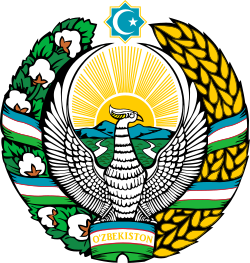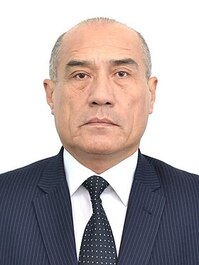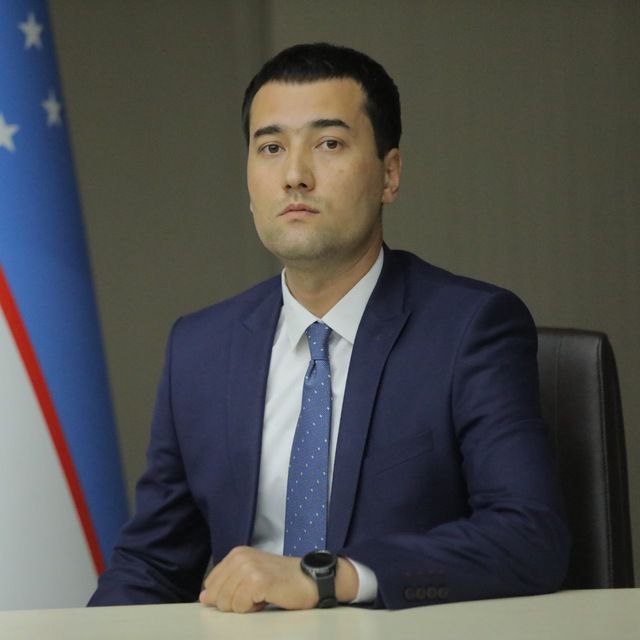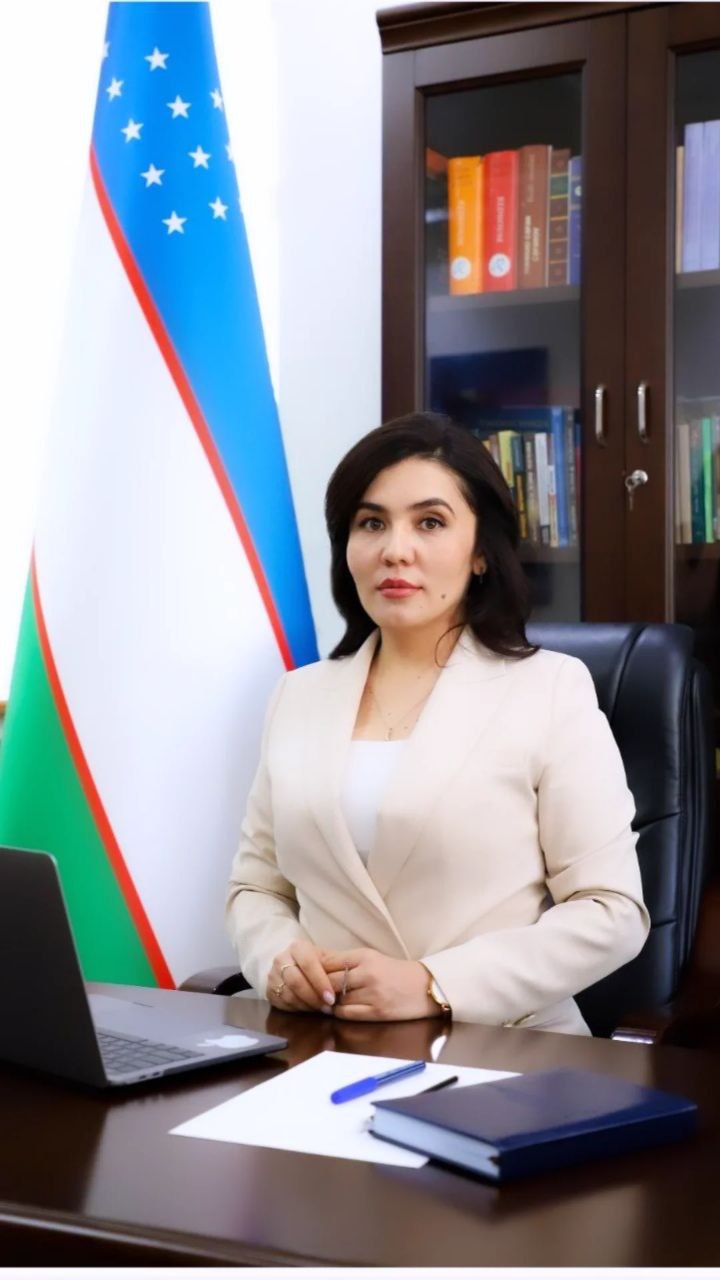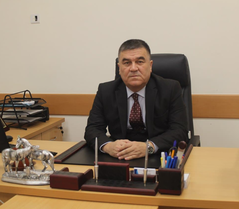Sirojiddinov Shuhrat Samariddinovich
Rector of Alisher Navoi' Tashkent State University of Uzbek Language and Literature
Date of birth: 23.07.1961
Place of Birth: Samarkand
Nationality: Uzbek
Position: Rector of Alisher Navo’i Tashkent State University of Uzbek Language and Literature
1978-1984 - | Student at the Tashkent State University of Oriental Studies |
1984-1984 - | Assistant, Chair for Eastern literature, Tashkent State University |
1984-1986 - | Military Service |
1987-1993 - | Teacher, Samarkand State University |
1993-1998 - | Senior researcher, Academy of Sciences of Uzbekistan, Samarkand Branch |
1998-2003 - | Deputy Chairman of “Imam Al-Bukhari” International Fund |
2003-2005 - | Head of the Chair of Philosophy and World culture, University of World Economy and Diplomacy, Tashkent |
2005-2012 - | Vice-rector, Uzbek State University of World languages |
2012-2014 - | Rector, Samarkand State Institute of Foreign Languages |
2014-2016 - | Rector, National University of Uzbekistan |
2016- present - | Rector, Alisher Navo’i Tashkent State University of Uzbek language and literature |
Awards and honors
• Academician of the Academy of Sciences of the Republic of Uzbekistan
• 1st degree Laureate of the State Prize of the Republic of Uzbekistan
• Laureate of Chingiz Aitmatov International Prize
• Honorary Doctor of Azerbaijan Academy of Sciences
• Honorary Professor of Nizhny Novgorod State Linguistic University
• Co-chairman of the International Association of Central Asian Studies (Korea)
• Scientific Advisor of the Institute of Eurasian-Turkic Studies (Korea)
• Chairman of the Scientific Council for Awarding Doctorate Degree in Philological Sciences (Tashkent, Uzbekistan)
• Member of the Scientific Council for Awarding Doctorate Degree of Tashkent State Institute of Oriental Studies, Uzbekistan State World Languages University, National University of Uzbekistan
• Deputy Chairman of the Governmental Commission for Terminology of the Republic of Uzbekistan
• Member of the Writers’ Union of Uzbekistan
Editorial Experience
• 2012-2014 - Chief Editor of the Journal “Xorijiy Filologiya”(Foreign Philology)
• 2014-2016 - Chief Editor of the Journal “O’zMU Xabarnomasi” (National University Herald )
• 2018 – current – Chief Editor of the Journal “Oltin Bitiklar” (Golden Scripts)
• 2019 - current – Chief Editor of the Journal “Uzbekistan: Language and culture”
Membership in Editorial Boards
• Member of the Editorial Board of the International Journal “Müqayiseli edebiyyatşünasliq” (Azerbaijan)
• Member of the Editorial Board of the International Journal “The Journal of Eurasian Turkic Studies” (Korea)
• Member of the Editorial Board of the International Journal “Turkologiya” (Azerbaijan)
• Member of the Editorial Board of the International Journal “Karabuk Turkoloji Degresi” (Turkiye)
• Member of the Editorial Board of the Journal “Jahon adabiyoti” (Uzbekistan)
• Member of the Editorial Board of the Journal “Звезда Востока” (Uzbekistan)
• Member of the Editorial Board of the Journal “Imom Buxoriy Saboqlari” (Uzbekistan)
• Member of the Editorial Board of the Journal “Filologiya masalalari” (Uzbekistan)
• Member of the Editorial Board of the Journal “Yer Yuzi” (Uzbekistan)
• Member of the Editorial Board of the Journal “Yoshlik” (Uzbekistan)
Participation in International Projects
1. “Translation of Uzbek Literature Anthology into English and issues of interliterary communication” (2012-2014).
2. QAPD516996-TEMPUS-1-2011-1-GB TEMPUS-SMGR: ‘Improving the quality of assurance system through the professional development of Senior Teaching Stuff’ (2013-2014).
3. “History of Uzbek Literature” 7-volume monographic study (2016-2018).
4. PZ-20170926459 - “History of Navo’i studies” (XX-XXI centuries) (2018-2020).
5. “Mobility for learners and staff” Erasmus+International Credit Mobility Programm (2021-2023).
6. IZ- 2021020813 – “Creating a multilingual multimedia collection on the basis of study and promotion of Alisher Navoi’s works abroad (2021-2023).
7. ‘Creating a multilingual (Uzbek, Russian, English) E-Platform of Uzbek Literature (2021-2023).
8. “Erasmus + KA107. Erasmus International + Credit Mobility Programme”, Bialsystok University, Poland (2020-2023).
9. IL-№52-21091433 “Creating a platform with database of articles on Uzbek realias” (based on the electronic encyclopedia Wikipedia) (2022-2023).
10. “The translation of Alisher Navo’i’s works into foreign languages and their teaching abroad” within the framework of Erasmus+KA107 Erasmus International + Credit Mobility Programme (2020-2023)
Scientific Works (Separate editions)
1. Interpretation of Human Spiritual Perfectness in Poetry. Samarkand, ‘Zarafshan’ Publishing House, 1992.
2. Kattakurgan: yesterday and today. Samarkand, ‘Zarafshan’ Publishing House, 1994 (co-authored).
3. The Inspiring Inspiration of Navo’i. Samarkand, ‘Zarafshan’ Publishing House, 1996.
4. Navo’I in the acknowledgement of his contemporaries. Samarkand, ‘Zarafshan’ Publishing House, 1996.
5. Ummon (Noji Biography). Samarkand, ‘Zarafshan’ Publishing House, 1996.
6. Interpretation of Alisher Navoi’s life in chronicles and memoirs of XV-XVI centuries. Samarkand, ‘Zarafshan’ Publishing House, 1997.
7. Maulana Lutfulah. ‘Imom al-Bukhori’ Publishing House, 2002.
8. Theology of Sufi Allayar. Tashkent, ‘Imom al-Bukhori’ Publishing House, 2001.
9. Ideas of harmony and tolerance in the works of great scientists. Tashkent, UWED Publishing House, 2005 (in Co-Authorship).
10. Uzbekistan: Interreligious harmony is a pledge of peace. Tashkent, UWED Publishing House, 2005 (in Co-Authorship).
11. Peace and Tolerance.Training manual. Tashkent, UWED Publishing House, 2005 (co-authored).
12. Religions of the World. Tashkent, UWED Publishing House, 2006.
13. Religious and philosophical teachings of Central Asia. Tashkent, Institute of Philosophy and Law of the Republic of Uzbekistan, 2007 (co-authored).
14. Tolerance is the educational basis of religions. Tashkent, TSIOS Publishing House, 2010.
15. Introduction to Islamic Philosophy: Kalam. Tashkent, ‘Iqtisod-Moliya’ Publishing House, 2008.
16. The boundaries of science and imagination. Tashkent, Yangi Asr Avlodi, 2011.
17. Philosophical reflections of Uzbek classical literature. Tashkent, Yangi Asr Avlodi, 2011.
18. Alisher Navoi: comparative-typological , textological analysis of sources. Tashkent, Akademnashr, 2011.
19. Fundamentals of literary translation. Tashkent, ‘Mumtoz so’z’ Publishing House, 2011 (co-authored).
20. Interpretation of artistic text. Samarkand, SSFLU, 2014 (co-authored).
21. Aspects of Uzbek textual studies: text, analysis and experience. Tashkent, 2015 (co-authered).
22. Fascination of melodious couplets. Tashkent, ‘Bayoz’ Publishing House, 2017 (co-authered).
23. Navo’i the great Tashkent, Gafur Gulam, 2018.
24. Navoi Studies. Tashkent, Tamaddun, 2018. (co-authered).
25. Navoi’s Beliefs. Tashkent, 2019.
26. Lessons of textual studies. Tashkent, Akademnashr, 2019.
27. Methods of conversion of Gregorian and Hijri Calendars. Tashkent, Mukharrir, 2019.
28. Amir Alisher. Tashkent, 2023.
29. Amir Alisher. Baku, 2023 (in Azerbaijani language)
30. "Alisher Navoiy (hayot yoʻli)", 2025.
31. "The phonemenon of Alishir Nava'i", 2024.
Tasks
• Organize the implementation of laws of the Republic of Uzbekistan, decrees and orders of the President, resolutions of the Upper house and the Cabinet of Ministers in the field of education and training;
• Provide training of highly qualified personnel with high moral and ethical qualities, able to think independently, mastering the methods of organizing work in a market environment;
• Organize of training of highly qualified personnel based on state educational standards;
• Ensure the implementation of the tasks set by the Law of the Republic of Uzbekistan "On Education" at TSUULL;
• Define the powers of all departments of the structure of TSUULL, planning, coordination, management of their activities, training of qualified personnel for management positions of TSUULL, selection of staff, recommendation and recruitment to management positions;
• Control over the formation and effective use of revenues of TSUULL;
• Elaborate research, increasing their effectiveness and widely implementing the results of research, ensure the integration of higher education, science and industry;
• Organize the creation, translation and publication of textbooks and teaching facilities in accordance with the requirements of the concept of creating a new generation of textbooks for continuing education ;
• Develop the introduction and effective use of advanced forms of teaching in the educational process, including distance learning, new pedagogical and information and communication technologies ;
• Enrollment, expulsion, reinstatement of students, master's and trainee researchers in the university, ensuring compliance with internal labor regulations;
• Organize social services and other conditions for students, trainees-researchers, research and teaching staff, ensuring their social protection;
• Ensure continuous quality control of the activities of faculties and departments, the educational process based on the credit module system, lectures, training and production practices, other types of training
• Organize of events at TSUULL to determine the prospects for the development of areas of specialization (scientific and practical conferences, participation in international conferences, creating conditions for the use of information space, literature, information materials on the development of science and technology) ), on the basis of which to ensure the improvement of state educational standards, curricula, textbooks, to direct scientific research;
• Develop a marketing service, study the demand and need for education and specialties, analyze the practical employment of graduates, conclude cooperation agreements on targeted training;
• Develop and implement of measures to strengthen and develop the material and technical base of TSUULL, to lead the Academic Council of TSUULL, to improve the structure of TSUULL;
• Develop scientific and creative relations with foreign partners, ensuring investment and grants for education, the establishment of research centers (departments, research, projects, etc.);
• Collaborate with public organizations, boards of trustees and other similar non-governmental organizations;
• Take measures to increase the prestige of the Uzbek language not only at the national level, but also in the world community, and to this end to organize courses in the Uzbek language in the leading countries of the developed world;
• Create the necessary conditions for the promotion of Uzbek literature in the context of modern world literature and the implementation of appropriate measures and research in the field of translation;
• Lead the process of developing and implementing a national concept of teaching Uzbek language and literature in accordance with world educational standards;
• Supervise the development of theoretical and methodological bases for teaching Uzbek as a second language in other language groups;
• EnsurE the implementation of other tasks set by the competent authorities for the management of the educational process;
• Perform duties honestly.


